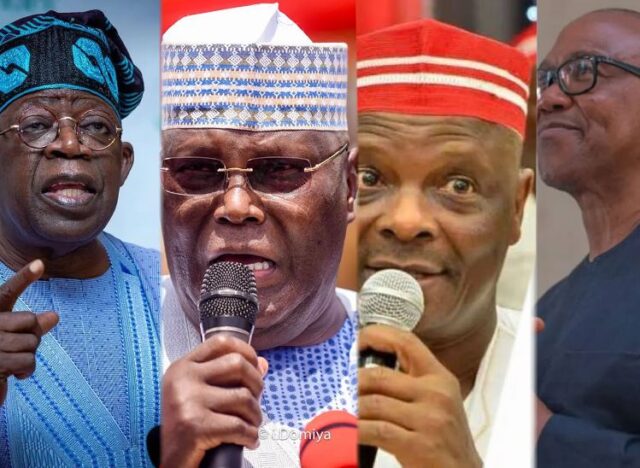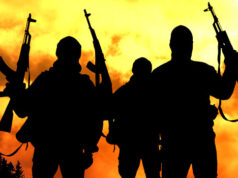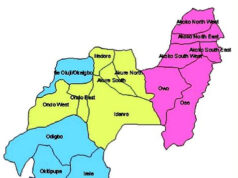To prevent Nigeria from falling into a one-party dictatorship, seven political parties and others led by the main opposition Peoples Democratic Party, PDP, recently commenced moves to hammer out a coalition to stop the ruling All Progressives Congress, APC.
The seven parties are the PDP; New Nigeria People’s Party, NNPP; African Democratic Congress, ADC; Allied Peoples Movement, APM; Social Democratic Party, SDP; Young Progressives Party, YPP; and Zenith Labour Party, ZLP.
Known as ‘the Coalition of Concerned Political Parties, CCPP’ the group was formed in Abuja, on December 6, at a meeting attended by leaders of the seven political parties at the National Secretariat of the SDP.
The 2023 Presidential Candidate of the PDP and former Vice President, Alhaji Atiku Abubakar, had while hosting the National Executive Committee, NEC, of the Inter-Party Advisory Council, IPAC, on November 14, warned against the likelihood of Nigeria slipping into a one-party state and asked the opposition to close ranks.
The division of the PDP into three camps has been fingered as one of the major reasons President Bola Tinubu of the APC won the 2023 election.
Before the presidential primaries of the various parties in May 2022, Mr. Peter Obi, a former governor of Anambra State, who was Atiku’s running mate in the 2019 presidential election, left the PDP and joined the Labour Party, LP. Also, former Governor of Kano State, Senator Musa Kwankwaso, also left the PDP and joined the NNPP.
The trio contested the 2023 presidential poll. Atiku was PDP standard bearer. Obi bore the flag of the LP and Kwankwaso ran on the platform of the NNPP.
In the end, the 2023 presidential election panned out as the keenest in the history of balloting in Nigeria. Tinubu polled 8,794,726 votes to beat his closest challenger, Atiku with 1.81million votes, the lowest margin since 1979 in the history of presidential polls in the world’s largest black nation. Atiku got 6,984,520 votes at the election.
Tinubu won in 12 states. Atiku also won in 12 states. Mr. Obi polled 6,101,533 votes to place a close third. He won 11 states and the FCT. Kwankwaso came fourth with 1,496,687 votes and won in one state.
If the PDP was not balkanised, some pundits said it would have beaten the APC. Combined, Atiku and Obi polled 13.086 million votes. If Kwankwaso’s tally is added it would be 14.58 million votes.
Indeed, a host of analysts have opined that without coming together the opposition cannot stop the APC in 2027.
Why we’re uniting — Coalition leaders
Speaking to journalists after the meeting of the seven political parties, acting National Secretary of the PDP, Setonji Koshoedo, who represented the acting National Chairman, Umar Damagum, “the coalition wants to offer strong opposition for the good of Nigeria. Our duty is to offer alternative solutions to government policies.”
Chairman of the SDP, Shehu Gabam, said that the coalition was not a merger and not against the IPAC.
National Chairman of the ADC, Chief Ralph Nwosu, said the coalition wants “to strengthen our democracy. We have seen that people in government are trying to stifle viable opposition.”
National Chairman of the APM, Yusuf Dantalle, said there were more than seven parties in the coalition and some of them were not at the meeting. Representatives of other political parties at the gathering include acting National Chairman of the NNPP, Abba Kawu Ali; National Publicity Secretary of the YPP, Egbeola Martins and the national secretary of the ZLP.
Early friction
However, leaders of the coalition have a huge task at hand if they were to realise their quest following early dangerous signals. Some leaders of the LP, SDP and NNPP, have distanced themselves from the emerging coalition.
We’re not involved in merger talks— LP
Before the coalition was fully consummated, the Julius Abure-led national executive of the Labour Party said that the party was not involved in talks to either form a coalition or merge with any other opposition party.
National Publicity Secretary of the party, Obiora Ifoh that the party leadership was approached and it was not considering such a move, adding that those peddling rumours that the LP endorsed a new coalition of opposition political parties were a group of individuals who were desperate to derail the LP’s rebuilding efforts.
His words: “There was news in the media that a group of seven opposition political parties formed a new coalition tagged the Coalition of Concerned Political Parties. As was noticed, the Labour Party was not represented at the meeting in question and therefore couldn’t have been part of the coalition as suggested by the publication.
“The publication we can confirm quoted one of our officials out of context by giving a false impression that the Labour Party endorsed the coalition.
“We have continued to posit that the Labour Party is still undergoing a post-mortem of the 2023 general election and until after the exercise, we will not be in a hurry to join the fray of any political arrangement.
“However, we will continue to participate in select meetings of like minds where issues arising from the last general elections are discussed with intentions to propose plausible solutions to developments that are threats to our democracy.”
SDP faction dismisses coalition move against Tinubu
Also, a faction of the SDP in in a statement by its National Publicity Secretary, Alfa Mohammed distanced the party from the coalition, describing it as “unpatriotic and undemocratic political tactics.’
He said: “The Social Democratic Party wishes to clarify its position regarding recent reports circulating in the media. These reports suggest that the SDP, alongside other major opposition parties in Nigeria, is involved in forming a coalition against President Tinubu’s administration.
We acknowledge the existence of a substantial conspiracy, reportedly backed by influential opposition figures and certain private sector entities. This conspiracy aims to establish a formidable coalition, including opposition parties, trade unions, and civil society organizations. The goal is to turn public opinion against the current government, potentially leading to its undemocratic removal. However, the SDP firmly distances itself from such unpatriotic and undemocratic political tactics.
To eliminate any confusion, it is important to note that the mainstream SDP, currently embroiled in a legal struggle against certain factions illegitimately recognized by INEC, is committed to engaging with President Tinubu’s administration in a constructive manner for the next three years. This approach excludes any involvement in schemes aimed at destabilizing the government or distracting its focus.”
Count us out of coalition with PDP, others—NNPP scribe
The National Secretary of NNPP, Alfa Mohammed, spoke in a like manner, disclaiming the coalition as fake and untrue.
In a letter to the Board of Trustees Chairman of the PDP, he cautioned PDP to stop dealing with people he said did not represent the interest of NNPP adding that the party had not been sold to Kwankwaso and his supporters.
Sunday, who said he wrote on the “collective” instruction of Dr. Boniface Aniebonam, founder and life member of the NNPP Board of Trustees, BoT; Dr. Temitope Aluko, BoT chairman; Engr. Abdullahi Babayo, BoT secretary; and NNPP National Chairman, Dr Agbo Gilbert Major, asked the PDP to desist from using the name of the NNPP in the coalition move through Kwankwaso.
Noting that the NNPP gave its platform to Kwankwaso for the 2023 presidential poll, he said: “But it is worthy of note that we did not sell our party to Senator Kwankwaso and his Kwankwasiyya group, and Senator Kwankwaso is not the owner of NNPP. He only came to contest in the 2023 general elections and lost as afforded him under the Memorandum of Understanding entered with Kwankwasiyya and TNM in 2022. The said Memorandum upon which they came has no legal or binding effect on NNPP, same having expired after the general elections, and Senator Kwankwaso and his cohorts have been expelled from NNPP.
“This letter therefore serves as a formal caveat to your party -PDP and others by notifying you that the NNPP has not, and is not authorizing any coalition with your party or any other political party for that matter as is being speculated and published.
“In the circumstance, to do otherwise and proceed with the purported coalition in any matter with Senator Kwankwaso in the name of the NNPP, will be serious hypocrisy on your part and feigning ignorance of a glaring and well established fact that Senator Kwankwaso is not a member of the NNPP, and he has no locus or authority to engage in any form of negotiation and/or coalition on behalf of our great party (NNPP).
“The relevant regulatory agency, security agency of the Federal Government and the general public will be notified immediately to ensure that your party and Senator Kwankwaso do not cause any further damage to our party, and to prevent any avoidable breakdown of law and order, besides needless litigation.
“We strongly request that you avoid our terrain and mind your business please, to ensure a peaceful and cordial co-existence of Inter Party relationship.”
APC mocks Atiku
Riding on the crest of the dissent, the APC slammed Atiku for calling on the opposition to merge, saying that he is only struggling to come to terms with the reality of having lost at the presidential poll.
In a statement by its National Publicity Secretary, Felix Morka, the party urged the PDP to focus on resolving its internal party crisis.
“It is pitiful that a statesman of Atiku’s standing would so easily conflate the wide acceptance of our great party among Nigerians with his irrational fear of one-party dictatorship.
“Remarkably, Atiku and his PDP have not only consistently failed at the polls, they have proved incapable of offering a credible alternative political vision as expected of an opposition party. We urge Atiku to concentrate on repairing his damaged political psyche and attempt to revive his comatose PDP and leave APC out of their combined predicament,” Morka said.
Our coalition’ll get bigger, better
However, one of the members of the coalition said there was no going back on their push to save Nigeria, adding that “the baby has been born, the coalition will grow bigger and stop APC.”
It is to be seen whether the seven parties and others will repeat the feat achieved by the APC in 2015
In August 2013, APC was registered after a successful merger of the Action Congress of Nigeria, ACN; Congress for Progressive Change, CPC; All Nigeria Peoples Party, ANPP and some elements of the All progressives Grand Alliance, APGA among others. The party went on to beat the PDP in the 2015 presidential poll. It was the first time a merger of opposition parties succeeded in Nigeria. It was also the first time a ruling party lost a presidential election in Nigeria.
Past mergers,
alliances
Before 2015, Nigeria’s political history was replete with failed alliances and mergers. In the First Republic, the United Progressive Grand Alliance, UPGA, consisting mainly of the National Council for Nigerian Citizens, NCNC, and the Action Group, AG, attempted to form an alliance to stop the Northern People’s Congress, NPC. The effort died before it could bear fruit because UPGA leaders could not sink their ambitions and differences and so failed to present a joint presidential candidate to tackle then Prime Minister, Sir Abubakar Tafawa Balewa.
In the Second Republic, the Nigerian People’s Party, NPP; Unity Party of Nigeria, UPN); People’s Redemption Party, PRP; and Great Nigerian People’s Party, GNPP; formed the People’s Progressive Alliance, PPA, which also failed to click against the National Party of Nigeria, NPN.
In 1999, the Alliance for Democracy, AD, which had swept the South-west in earlier polls, aligned with the All Peoples Party, APP, that dominated elections in the North with the intention of beating PDP at the presidential poll. It gave the PDP a good fight but failed to win the election.
In 2007, about 15 parties came together and formed the Action Congress, AC, but the party made little or no impact in the presidential election.
Before the 2011 elections, the ACN, CPC, and ANPP attempted to join forces in order to field a joint presidential candidate to challenge then President Goodluck Jonathan of the PDP. The move failed when the parties could not reach agreement on who to field. While the CPC fielded Major General Muhammadu Buhari, ACN handed its ticket to Nuhu Ribadu. Before then, Buhari had pulled out of the ANPP on which platform he contested the presidential seat in 2003 and 2007.
After the 2011 elections, leaders of the merging parties kick-started another move that bore dividends in 2015.







